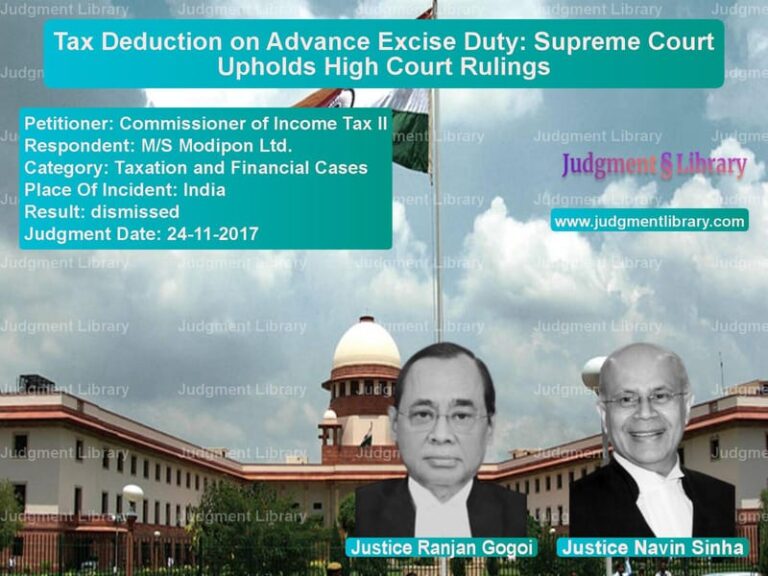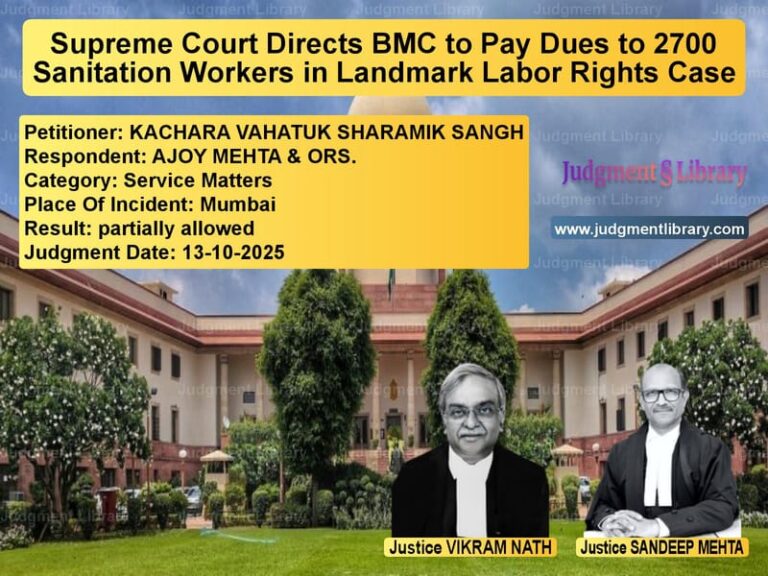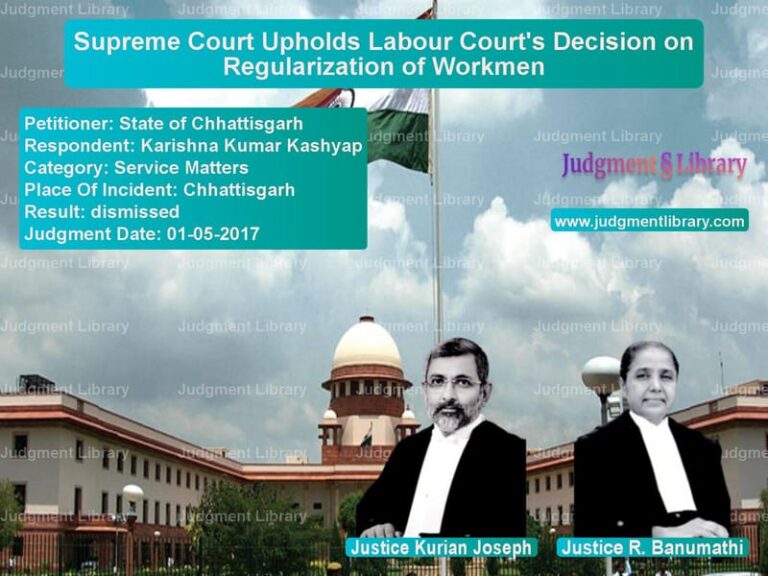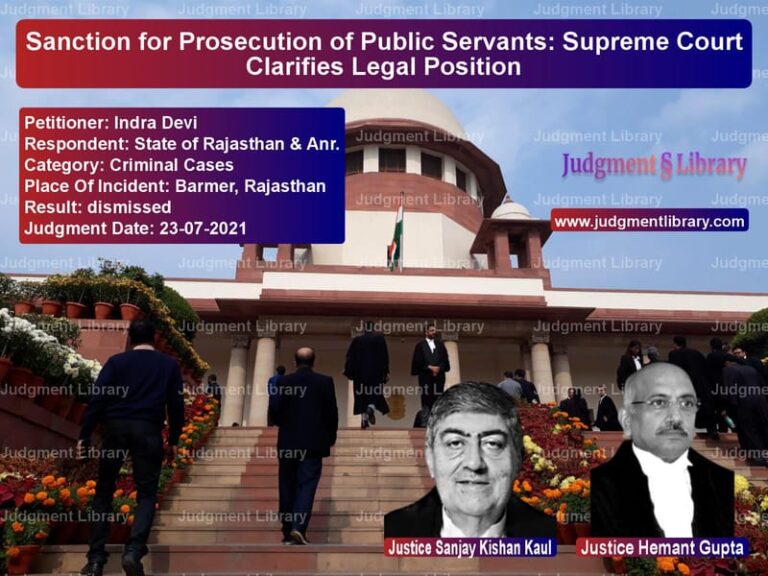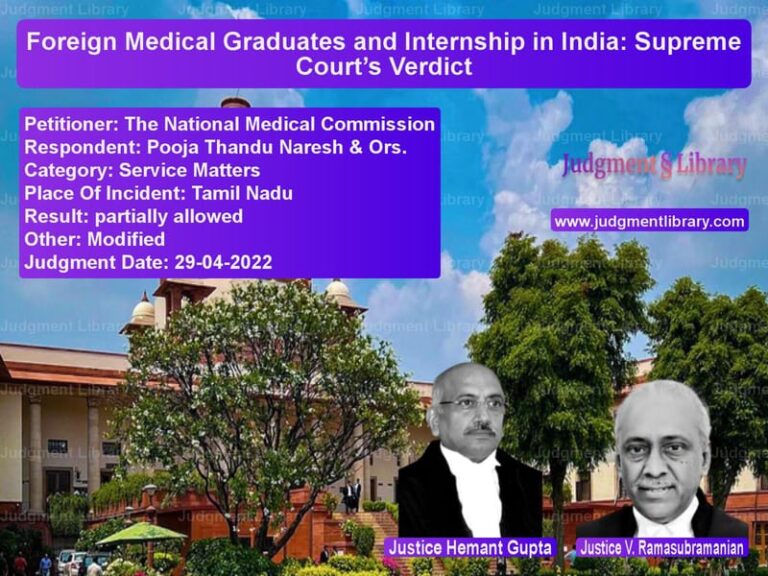Supreme Court Upholds Dismissal of Postal Assistant Over Fraudulent Commission Payments
On November 21, 2019, the Supreme Court of India delivered a crucial judgment in the case of Union of India vs. Udai Bhan Singh, affirming the dismissal of a postal assistant found guilty of authorizing fraudulent commission payments to fake National Savings Certificate (NSC) agents. The Court overturned the High Court’s ruling, which had reinstated the employee with full back wages, and upheld the Central Administrative Tribunal’s (CAT) decision to maintain the disciplinary penalty.
Background of the Case
Udai Bhan Singh was appointed as a Postal Assistant in the Head Post Office at Allahabad on December 13, 1978. He was responsible for handling payments under the NSC scheme. Between July 15, 1985, and February 10, 1986, Singh allegedly authorized fraudulent commission payments to fake agents without verifying their credentials. A charge-sheet was issued against him on August 31, 1988, listing three main charges:
- Failure to verify NSC commission bills properly, resulting in fraudulent payments amounting to Rs. 6,65,693.60.
- Preparation of duplicate money paid receipts and unauthorized payments at different post offices.
- Failure to submit commission payment schedules and supporting vouchers to the Audit Office, thereby violating postal regulations.
Disciplinary Proceedings
An inquiry was conducted, and the Inquiry Officer found the first and second charges to be partially proved and the third charge fully proved. Based on the findings, the disciplinary authority initially imposed a penalty of pay reduction for five years. However, after an appeal and review, the penalty was enhanced to dismissal from service.
Singh challenged his dismissal before the Central Administrative Tribunal (CAT), which upheld the decision, ruling that the charges were substantiated. Dissatisfied, he moved to the Allahabad High Court.
High Court’s Decision
The Allahabad High Court ruled in Singh’s favor, setting aside the disciplinary penalty on two grounds:
- Violation of natural justice, as relevant documents were not provided to Singh during the inquiry.
- Delay in proceedings, with a show-cause notice issued eight years after the Tribunal’s first ruling.
The High Court reinstated Singh with full back wages and consequential benefits, prompting the Union of India to appeal before the Supreme Court.
Supreme Court’s Observations
The Supreme Court examined the evidence and found the High Court’s ruling flawed. The key observations were:
1. No Violation of Natural Justice
The Court noted that the Tribunal and appellate authority had considered the claim that documents were not provided but found that sufficient material was available to establish misconduct. The Court stated:
“The High Court did not examine which specific documents were withheld or the extent of prejudice caused to the respondent.”
2. Justification of Disciplinary Action
The Court held that the charges of fraudulent payments were supported by evidence. The disciplinary authority had issued a show-cause notice and given Singh a chance to respond, fulfilling due process requirements.
3. Delay in Proceedings
The Supreme Court found that the delay in issuing the show-cause notice after the Tribunal’s first ruling did not prejudice Singh, as he had been reinstated and paid salary during the intervening period. The Court referred to precedents, emphasizing:
“Delay in disciplinary proceedings does not automatically vitiate an inquiry unless prejudice is shown.”
Final Judgment
The Supreme Court ruled:
“The High Court was in error in interfering with the disciplinary jurisdiction of the appellants. The misconduct was proved, and the penalty imposed cannot be held disproportionate or arbitrary.”
Accordingly, the Court:
- Set aside the High Court’s order reinstating Singh.
- Affirmed the CAT’s ruling dismissing Singh’s challenge.
- Allowed Singh to retain salary received during reinstatement but denied further back wages.
Legal Implications of the Judgment
This ruling reinforces key principles in employment and disciplinary law:
- Natural justice claims must show actual prejudice. Mere allegations of missing documents are insufficient.
- Delays do not automatically invalidate disciplinary proceedings. Each case must be assessed individually.
- Judicial review is limited in disciplinary matters. Courts should not interfere unless clear procedural lapses or arbitrary penalties exist.
Conclusion
The Supreme Court’s decision in Union of India vs. Udai Bhan Singh upholds the importance of accountability in government service. The ruling ensures that fraudulent actions in public offices do not go unpunished while affirming the limits of judicial review in disciplinary cases. By rejecting the High Court’s lenient approach, the Supreme Court reaffirmed that procedural delays alone cannot be grounds for reinstatement without proof of substantial prejudice.
Petitioner Name: Union of India.Respondent Name: Udai Bhan Singh.Judgment By: Justice Dhananjaya Y Chandrachud, Justice Ajay Rastogi.Place Of Incident: Allahabad, Uttar Pradesh.Judgment Date: 21-11-2019.
Don’t miss out on the full details! Download the complete judgment in PDF format below and gain valuable insights instantly!
Download Judgment: Union of India vs Udai Bhan Singh Supreme Court of India Judgment Dated 21-11-2019.pdf
Direct Downlaod Judgment: Direct downlaod this Judgment
See all petitions in Disciplinary Proceedings
See all petitions in Public Sector Employees
See all petitions in Termination Cases
See all petitions in Judgment by Dhananjaya Y Chandrachud
See all petitions in Judgment by Ajay Rastogi
See all petitions in allowed
See all petitions in supreme court of India judgments November 2019
See all petitions in 2019 judgments
See all posts in Service Matters Category
See all allowed petitions in Service Matters Category
See all Dismissed petitions in Service Matters Category
See all partially allowed petitions in Service Matters Category


